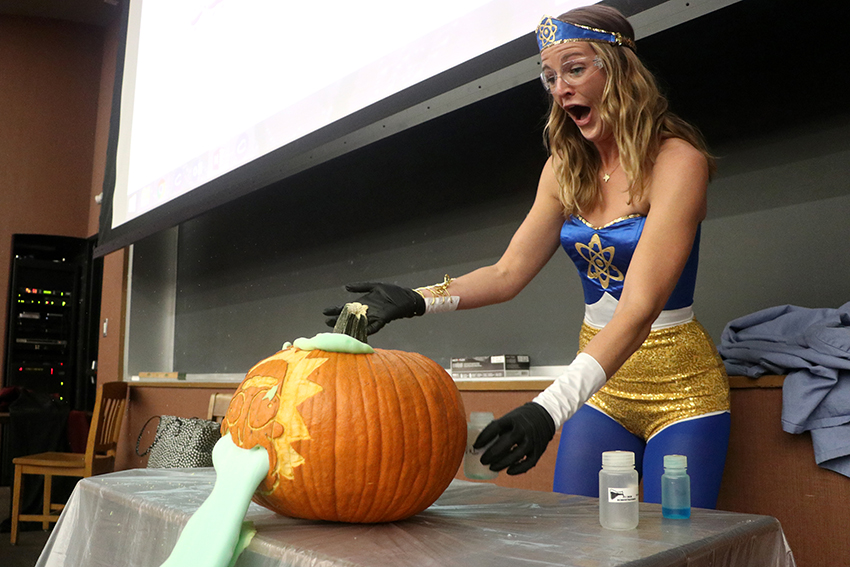The UT System and Kate the Chemist are using video games to spark interest in STEM with their new Careers in Chemistry project.
Careers in Chemistry was created with help from DISCO Learning Media, a UT alumni-created education innovation company, for the website Minecraft: Education Edition, a version of the popular video game Minecraft. In Minecraft Edu, players use the open-world crafting mechanics to explore topics ranging from coding to art and design. The module will be available for download in the middle of February through the Minecraft Edu website.
The UT System brought on Kate Biberdorf, also known as Kate the Chemist, to help write the project. Biberdorf’s innovative chemistry demonstrations launched her into national popularity with appearances on The Late Show with Stephen Colbert and The Wendy Williams Show.
“When you step into a digital platform, you really can tap into the make-believe, but in reality you’re showing them how these (chemical) pieces can come together,” chemistry professor Biberdorf said. “They think they’re doing magic but really it’s science, and it’s just a great way to promote the level of STEM.”
Through Careers in Chemistry, players will explore four unconventional chemistry-based career paths: chef, science journalist, chemistry teacher and art conservationist. The game will guide them through activities based on these jobs in which the player will combine chemicals to achieve in-game goals.
“Chemistry is one of the most popular subjects in the Minecraft Education environment right now … but what was overall lacking was this idea of how you actually get a career in chemistry,” DISCO President Juan Garcia said. “Minecraft educators are trying to target high school age ranges with their content, so we thought this was a perfect opportunity.”
The classic version of Minecraft has over 91 million monthly players, a large chunk of which are under the age of 21. This age group has seen a 12 percent decline of interest in STEM careers between 2017 and 2018, according to Junior Achievement, a nonprofit dedicated to youth education.
Nichole Prescott, assistant vice chancellor for Academic Affairs, said this game is part of the UT System’s overall goal to reinvigorate interest in STEM and prepare K-12 students for college.
According to the National Assessment of Educational Progress’ 2015 assessments, only 25 percent of high school seniors are proficient in math and only 22 percent are proficient in science.
“When we look at the educational attainment in the state of Texas, there are some major gaps and there are a lot of gaps in STEM fields,” Prescott said. “Even within the STEM fields, there’s not a lot of diversity of students going into STEM, so we really want to increase access of students of all types to get interested in going into a STEM field.”
Biberdorf said she joined the project to inspire young people, especially girls, to join STEM fields.
“There’s something about that middle school age where … all of a sudden, girls believe that they can’t do science or can’t do math,” Biberdorf said. “What I’m hoping to do is open the doors for more girls, and boys in general, and show them what you could do with this knowledge.”


















